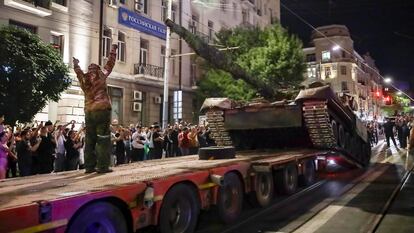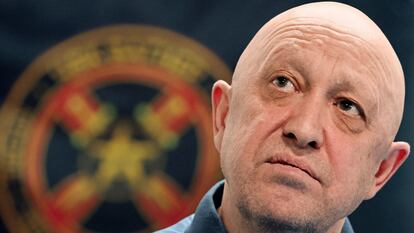Wagner rebellion sharpens divisions in Russia’s military forces
The support received by the mercenary group is threatening the united front that the Kremlin is trying to build


The logo of the Wagner Group — a skull at the point of a gun’s red viewfinder — was becoming popular on the streets of Russia until the mercenary group launched a rebellion last weekend. People as different as the manager of a cheap Moscow hostel, a young man from a posh gym and a mutilated man on the street were united by the symbol of Yevgeny Prigozhin, the leader of Wagner, and the new Russian alpha male who has challenged the Ministry of Defense’s bombastic propaganda about the war in Ukraine. As the mercenaries marched towards the Russian capital on Saturday, they were met with applause from the people and the passivity of the armed forces.
“The purpose of the march was to prevent the destruction of PMC Wagner and to bring to justice those who, through their unprofessional actions, made a huge number of mistakes during the special military operation,” Prigozhin said in an audio message on Monday. His survival — both politically and literal — presents a new threat to the regime. But Putin needs the mercenaries. One day after shaking Russia to its foundations, Wagner pins and T-shirts were back on sale in stores.
“The consensus of the experts is that it is very likely that Aleksey Dyumin — Putin’s former bodyguard and current governor of Tula — will become the new Defense Minister and General Sergey Surovikin will become the Chief of the General Staff,” said Sergei Markov, a former Putin adviser who is very close to the Russian president, on Monday. Current Defense Minister Sergei Shoigu is in such a weak position that even Russian pro-war channels argued that a video of him reportedly making his first public appearance since the uprising was recorded days earlier. “But the dismissals will not happen immediately so that it is not thought that Shoigu and [Valery] Gerasimov — the current Chief of the General Staff — were dismissed at the request of the rebel,” adds Markov.
Infighting within the Russian armed forces came to the fore after early setbacks in the fall of 2022, when Ukraine recaptured parts of Kharkiv and Kherson. Surovikin was promoted to sole commander of the offensive to the applause of Prigozhin and the head of the Chechen Republic, Ramzan Kadyrov, whose Praetorian Guard-type force, known as The Kadyrovtsy, has also played a key role in the war. But the joy was short-lived: in January, Shoigu appointed Gerasimov as Chief of the General Staff to the detriment of Surovikin.
The failed rebellion has also revealed the doubts of many figures close to the Kremlin. The Chechen leader took more than half a day to publicly declare himself in favor of Putin, while Margarita Simonyan, the editor-in-chief of the Russia Today media outlet and until recently a fervent fan of Wagner, explained on Monday that she was not aware of what was happening because she “had been on a boat on the Volga river.”
The Kremlin’s strategy against Prigozhin’s rebellion was to appeal for unity in support of the president. On Monday, lawmakers called for blind support for Putin, while other sectors backed the message. “In difficult times, the loyalty of the Russian people to its leaders has always helped us,” a radio presenter on Last.FM read out dispassionately “at the request of music producers.” Last.FM happens to be a radio station that is heard at all hours in taxis throughout the country.

Wagner shows it is indispensable
Prigozhin’s paramilitaries had been described as mere “cannon fodder,” as soldiers who are sent in for suicide missions. But the debate about whether Wagner Group should be dismantled or not shows that Prigozhin may still have an ace up his sleeve. Andrey Kartapolov, the head of the Defense Committee of Russia’s lower house, the State Duma, defended the existence of Wagner despite presenting a bill that regulates mercenary companies.
“Joseph Vissarionovich Stalin said that children are not responsible for the actions of their parents. The person who started the rebellion must answer [...] Wagner is the best trained unit in Russia, and even the armed forces recognize it. It’s difficult to imagine a better gift for NATO and the Ukrainians than to disarm them,” Kartapolov said Monday, justifying that his new law “requires a laborious study” that could be delayed until the fall. It’s a curious legal move, given that mercenary groups have been prohibited by law since before Wagner was even founded.
The Ministry of Defense, however, is in favor of disarming the mercenaries. Other influential figures in Russian politics have supported this position. Politician and former Soviet soldier Viktor Alksnis, who is known as “The Black Colonel,” reminded the State Duma that they only recently approved a law that sentences people to up to 15 years in prison for criticizing the Wagner Group. “There cannot be two (three, four, etc.) armies in one state! All military contractors and other armed formations must be banned and disarmed!” he wrote on Telegram, where he pointed out another threat: “I wonder what President Putin will do now with Kadyrov’s Chechen army, which has more than 70,000 bayonets.”
Another influential Putin adviser, Vladislav Surkov, also backed the call to disarm Wagner. “In Russia, it is impossible to have a private nuclear power plant. How about a private assault division? Why? These private armies have only emerged in Russia during times of unrest and the 1920 Civil War,” he said in an interview with political scientist Alexei Chesnakov. “Why do we need them [Wagner] now that we openly participate in the battle for Ukraine?” he added in recognition that the mercenary group was used to hide the fact that the Kremlin was provoking the armed conflict in the Donbas region of Ukraine.

The images of civilians cheering Prigozhin’s troops in Rostov-on-Don have sparked fear among the Russian elite, who are now aware of how popular the mercenary chief has become thanks to his criticism of Shoigu. The feared Russian internet vigilante, Roskomnadzor, immediately blocked access to Prigozhin’s posts on Vkontakte (VK)— the Russian equivalent of Facebook — while the main online sales platforms, Ozon and Wildberries, hid Wagner merchandise during the rebellion and vowed to “remove them” completely in the near future.
The fear of supporting Wagner lasted little longer than Prigozhin’s aborted advance on Moscow. By Monday, Wildberries was offering 11,565 “musician” products on the platform. “Wagner, the musicians the whole world knows” was the slogan of a flag held up by a model surrounded by flames. The background featured a paramilitary armed with a violin, a rifle and a rocket launcher. Some of the other popular so-called “musician” products included car key rings, clothing emblems, machetes, and caps. Many of them were sold out, while delivery times were more than a week long.
Prigozhin has gained prominence in Russian due to his criticism of the military top brass. According to a survey by the independent sociological center Levada, for the first time in May, he was listed among the top 10 most-trusted political figures in Russia. The survey found that 4% of citizens trusted him, compared to 11% for Shoigu. Playing against Prigozhin are the crimes of his mercenaries. The most recent happened the same day as the rebellion: on June 23, three former mercenaries got drunk in the Russian city Kurgan and opened fire in an area of country houses. This time no one was hurt, which cannot be said for other similar incidents that have occurred in recent months.
Sign up for our weekly newsletter to get more English-language news coverage from EL PAÍS USA Edition
Tu suscripción se está usando en otro dispositivo
¿Quieres añadir otro usuario a tu suscripción?
Si continúas leyendo en este dispositivo, no se podrá leer en el otro.
FlechaTu suscripción se está usando en otro dispositivo y solo puedes acceder a EL PAÍS desde un dispositivo a la vez.
Si quieres compartir tu cuenta, cambia tu suscripción a la modalidad Premium, así podrás añadir otro usuario. Cada uno accederá con su propia cuenta de email, lo que os permitirá personalizar vuestra experiencia en EL PAÍS.
¿Tienes una suscripción de empresa? Accede aquí para contratar más cuentas.
En el caso de no saber quién está usando tu cuenta, te recomendamos cambiar tu contraseña aquí.
Si decides continuar compartiendo tu cuenta, este mensaje se mostrará en tu dispositivo y en el de la otra persona que está usando tu cuenta de forma indefinida, afectando a tu experiencia de lectura. Puedes consultar aquí los términos y condiciones de la suscripción digital.








































